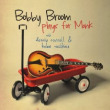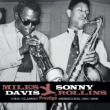 Lena Seikaly, Written In The Stars (Lena Seikaly). Ms. Seikaly sings with a rich mezzo-soprano voice, using intonation, timbre and control that reflect her classical training. Her phrasing, feeling and improvisatory leanings come from an understanding of jazz values. She makes the unconventional, even daring, decision to open her debut album by scatting her way into “East of the Sun and West of the Moon." Musicianship and her sense of proportion make the track, and the CD, a success. Ms. Seikaly may scat too much for some tastes, but she does it with a musician's grasp of harmony, not merely straining to be hip.
Lena Seikaly, Written In The Stars (Lena Seikaly). Ms. Seikaly sings with a rich mezzo-soprano voice, using intonation, timbre and control that reflect her classical training. Her phrasing, feeling and improvisatory leanings come from an understanding of jazz values. She makes the unconventional, even daring, decision to open her debut album by scatting her way into “East of the Sun and West of the Moon." Musicianship and her sense of proportion make the track, and the CD, a success. Ms. Seikaly may scat too much for some tastes, but she does it with a musician's grasp of harmony, not merely straining to be hip.
The more intriguing aspects of her performances here are in the ways she uses phrasing and tonal shadings to interpret songs when she's singing lyrics. There is an effective instance of that element of her work as she imparts a minor, almost modal, cast to her final chorus on “When I Fall in Love." She brings slight but effective variations of the melody to her straightforward treatments of “The Very Thought of You" and “Duke Ellington's Sound of Love," one of Charles Mingus's most moving ballads. Ms. Seikaly and tenor saxophonist Bobby Muncy achieve a rich blend on the wordless “Gravitation" and on “Written in the Stars," two of her four compositions here. Muncy solos well in a style influenced by John Coltrane. The Washington, DC, rhythm section is comprised of pianist Nathan Lincoln-Decusatis, bassist Tom Baldwin and drummer David McDonald. Leonardo Lucini subs on bass for one track. Ms. Seikaly is a singer with significant potential.
 Bobby Broom, Plays For Monk (Origin). Broom is too young to have worked with Thelonious Monk. He has been Sonny Rollins's guitarist for nearly thirty years. Rollins was a Monk sideman who absorbed the pianist's compositional, harmonic and rhythmic ethos, and it is likely that some of Rollins's Monk wisdom has rubbed off on Broom. When he was very young, Broom also worked with Art Blakey, Monk's ideal drummer. However he obtained it, in this relaxed, accessible collection, he brings depth of understanding to interpretations of eight Monk compositions and two standards that Monk enjoyed playing. Broom is not a speed demon virtuoso of the guitar, but a thoughtful improviser who knows the uses of space in the lines he creates. With bassist Dennis Carroll and drummer Kobie Watkins, Broom finds the beauty, humor, subtlety and swing that Monk put into “Ruby, My Dear," “Evidence," “Work," “Bemsha Swing" and, emphatically, the joy Monk always transmitted in his performances of the old pop song “Lulu's Back in Town." Broom gives a heartfelt treatment of Monk's ballad “Reflections," a composition of structural perfection. The guitarist graces the piece in a moving solo that Carroll follows with a statement of equal beauty. Broom closes with a Monk favorite, Jerome Kern's “Smoke Gets in Your Eyes." He plays it unaccompanied, out of tempo and with what may well be reverence for Kern as well as for Monk.
Bobby Broom, Plays For Monk (Origin). Broom is too young to have worked with Thelonious Monk. He has been Sonny Rollins's guitarist for nearly thirty years. Rollins was a Monk sideman who absorbed the pianist's compositional, harmonic and rhythmic ethos, and it is likely that some of Rollins's Monk wisdom has rubbed off on Broom. When he was very young, Broom also worked with Art Blakey, Monk's ideal drummer. However he obtained it, in this relaxed, accessible collection, he brings depth of understanding to interpretations of eight Monk compositions and two standards that Monk enjoyed playing. Broom is not a speed demon virtuoso of the guitar, but a thoughtful improviser who knows the uses of space in the lines he creates. With bassist Dennis Carroll and drummer Kobie Watkins, Broom finds the beauty, humor, subtlety and swing that Monk put into “Ruby, My Dear," “Evidence," “Work," “Bemsha Swing" and, emphatically, the joy Monk always transmitted in his performances of the old pop song “Lulu's Back in Town." Broom gives a heartfelt treatment of Monk's ballad “Reflections," a composition of structural perfection. The guitarist graces the piece in a moving solo that Carroll follows with a statement of equal beauty. Broom closes with a Monk favorite, Jerome Kern's “Smoke Gets in Your Eyes." He plays it unaccompanied, out of tempo and with what may well be reverence for Kern as well as for Monk.
If you don't get the reference implied in the CD's cover photo, this picture will help. It's one of Monk's classic Riverside albums, Monk's Music. Among its other virtues, it has Coleman Hawkins and John Coltrane as sidemen.
 Frank Glover, Politico (Owl). Glover plays clarinet in modern mainstream territory that shares a border with free jazz. In this reissue of a 2005 CD that had limited distribution, he performs with the energized rhythm section of pianist Steve Allee, bassist Jack Helsley and drummer Bryson Kern. His writing for a string ensemble on one piece and a 14-piece band on another has intimations of Gil Evans and Bla Bartok. Glover's playing, rich and woody in the lower register, tends toward shrillness during virtuoso excursions into the upper regions of the horn. His improvisations have a nice balance between long phrases and whirlwind flurries with adventuresome interval leaps. In the final movement of his 3-part “Concierto Para Quarteto," Glover and pianist Allee execute stunning unison passages that blend in and out of free sections so subtly that only the closest attention discloses what is written and what is improvised. Stimulating stuff.
Frank Glover, Politico (Owl). Glover plays clarinet in modern mainstream territory that shares a border with free jazz. In this reissue of a 2005 CD that had limited distribution, he performs with the energized rhythm section of pianist Steve Allee, bassist Jack Helsley and drummer Bryson Kern. His writing for a string ensemble on one piece and a 14-piece band on another has intimations of Gil Evans and Bla Bartok. Glover's playing, rich and woody in the lower register, tends toward shrillness during virtuoso excursions into the upper regions of the horn. His improvisations have a nice balance between long phrases and whirlwind flurries with adventuresome interval leaps. In the final movement of his 3-part “Concierto Para Quarteto," Glover and pianist Allee execute stunning unison passages that blend in and out of free sections so subtly that only the closest attention discloses what is written and what is improvised. Stimulating stuff.
 Miles Davis, Sonny Rollins, The Classic Prestige Sessions, 1951-1956 (Prestige). The 25 tracks in this two-CD set have been reissued to a faretheewell over the years in various configurations, and no doubt will continue to be for years to come. Like Louis Armstrong's Hot Fives and Hot Sevens, Dickens novels, the poetry of Yeats and Fred Astaire's films, they should be available in perpetuity. The five years of recordings here cover some of Davis's and Rollins's best work from their relative conceptual innocence in the immediate post-bop period to the mid-fifties, when each had become a formidable musician on the verge of fame and enormous influence. The sidemen constitute a hall of fame of the era. They include John Lewis, Percy Heath, Roy Haynes, Walter Bishop Jr., Art Blakey, Jackie McLean, Horace Silver and Charlie Parker. Yes, Charlie Parker. For any serious jazz listener, familiarity with these recordings is necessary to an understanding of how jazz developed over the past sixty years. A valuable bonus is Ira Gitler's liner note memoir about the days when he worked at Prestige as a jack of all trades and was intimately involved with most of the musicians who produced this essential music.
Miles Davis, Sonny Rollins, The Classic Prestige Sessions, 1951-1956 (Prestige). The 25 tracks in this two-CD set have been reissued to a faretheewell over the years in various configurations, and no doubt will continue to be for years to come. Like Louis Armstrong's Hot Fives and Hot Sevens, Dickens novels, the poetry of Yeats and Fred Astaire's films, they should be available in perpetuity. The five years of recordings here cover some of Davis's and Rollins's best work from their relative conceptual innocence in the immediate post-bop period to the mid-fifties, when each had become a formidable musician on the verge of fame and enormous influence. The sidemen constitute a hall of fame of the era. They include John Lewis, Percy Heath, Roy Haynes, Walter Bishop Jr., Art Blakey, Jackie McLean, Horace Silver and Charlie Parker. Yes, Charlie Parker. For any serious jazz listener, familiarity with these recordings is necessary to an understanding of how jazz developed over the past sixty years. A valuable bonus is Ira Gitler's liner note memoir about the days when he worked at Prestige as a jack of all trades and was intimately involved with most of the musicians who produced this essential music.


























